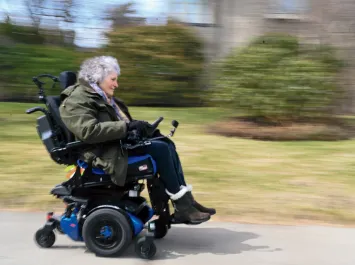Behind the Scenes: Quality of Care
Associate editor Lydialyle Gibson reflects on why disability is a topic that needs to be talked about more openly.
Americans don’t talk much about disability. It’s a subject that rarely cracks the national conversation, and even in one-on-one interactions, people often avoid it. There’s fear, and shame, and stigma; sometimes people just don’t know what to say.
But, in a way, this is a strange silence. Nearly one-third of adults in this country—73.4 million people, according to federal estimates—have some form of disability. And even more Americans have someone in their lives who is disabled. I have a close friend who went blind in her mid-20s. Watching her navigate a world that wasn’t built for her, and that often doesn’t make accommodations, has been enormously instructive. And just about everyone, if they live long enough, will likely develop a disabling impairment (in fact, long COVID has demonstrated just how susceptible anyone can be). So, disability is a topic that should be important to all of us. Why isn’t it?
When I first heard about Harvard Medical School researcher Lisa Iezzoni, I knew I had to talk to her. Iezzoni studies disability in settings where the failure to address it seems especially surprising: hospitals, doctors’ offices, and other clinical contexts. For nearly 30 years, she has been gathering data and conducting interviews with disabled patients, who share their experiences seeking health care, their fears and frustrations, and their stories of neglect and discrimination. In many cases, she has been among the first to record and analyze these experiences. Her interest comes in part from her own life—Iezzoni, who has multiple sclerosis, has used a wheelchair for decades.
A few years ago, she conducted a series of focus groups with doctors, which led to a nationwide survey. In interviews, doctors admitted to resentments and prejudices against patients with disabilities. Many told Iezzoni they didn’t have the equipment to accommodate those patients, as required by the Americans with Disabilities Act. Without wheelchair-accessible scales, for example, some doctors said they sent patients to be weighed at supermarkets or grain elevators or zoos.
But one statistic in that survey seems especially telling when it comes to our society’s collective reluctance to talk about disability: 82 percent of doctors said that their disabled patients have a worse quality of life. It was striking for Iezzoni to see that number in black and white, even though she knew it was an opinion widely shared in the medical profession and beyond. Even reporters who had called to interview her about the survey had sometimes unthinkingly expressed the same assumption. No wonder people tend to close themselves off from discussing disability.
But it’s an assumption that’s incorrect: research shows that a majority of people with disabilities, even “serious and persistent” ones, rate their quality of life as good or excellent. “Most people with disabilities don’t view their lives as tragic,” Iezzoni told me, a claim that her own remarkable life bears out. The same is true of my friend who is blind: she’s surrounded by friends, loved ones, and a devoted husband, engaged in meaningful work as a writer and teacher, immersed in the daily ebb and flow of the Chicago neighborhood where she lives. (In fact, she’s someone I’ve often turned to in gloomy moments when I need a dose of encouragement.)
Spending time with Iezzoni this winter, reading her books and journal papers, and talking with her colleagues and research collaborators, I learned so much about the place that disability occupies in our society and what that means not only for disabled patients seeking care but for all of us. Truly, we should talk more openly about disability. We could make life easier and better for everyone.
Over the course of profiling Iezzoni and her work, I consulted with lots of people, including Harvard Magazine’s longtime editor John Rosenberg, who retired at the end of April and was helpful in thinking about how to shape this story. I’m grateful for the time and generosity Iezzoni and other researchers granted me as I worked to learn the landscape of this huge and too-often invisible subject. And I’m grateful to have had the time and space to do this reporting, thanks to donors like you.
Read “Quality of Care”

